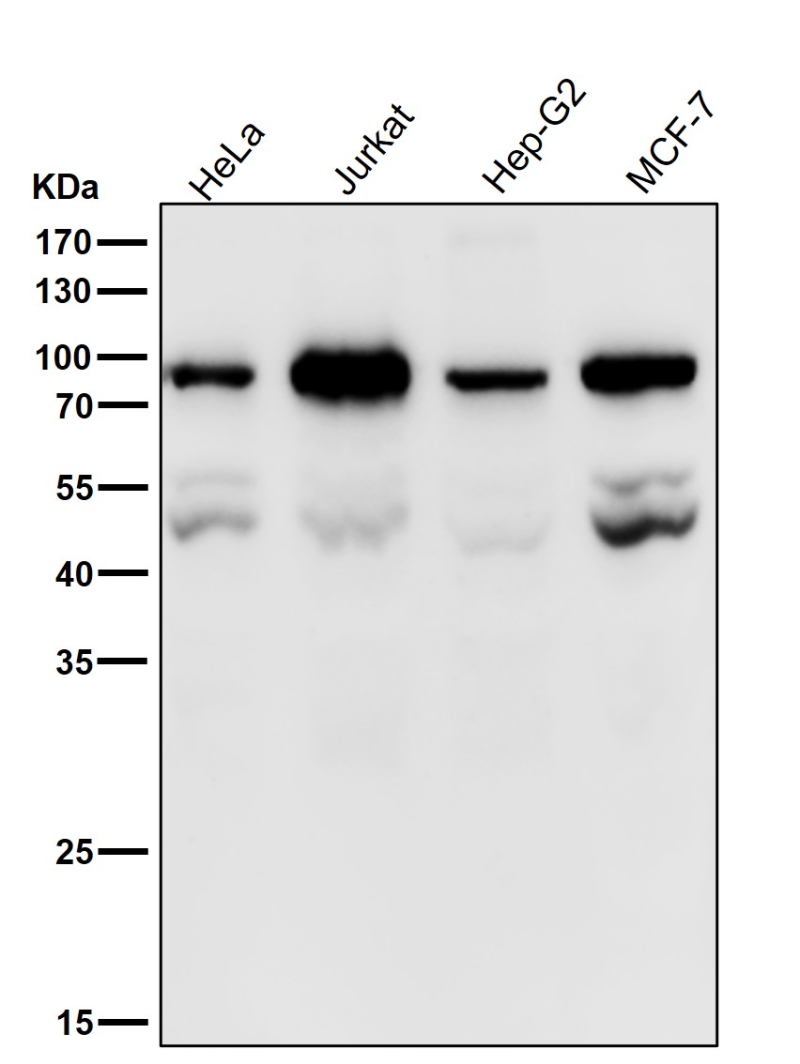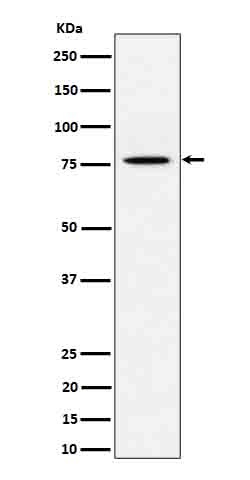

| WB | 咨询技术 | Human,Mouse,Rat |
| IF | 咨询技术 | Human,Mouse,Rat |
| IHC | IHC:1/100-1/200;IHF:1/50-1/200 | Human,Mouse,Rat |
| ICC | 1/50-1/200 | Human,Mouse,Rat |
| FCM | 咨询技术 | Human,Mouse,Rat |
| Elisa | 咨询技术 | Human,Mouse,Rat |
| Aliases | DFS70; LEDGF; p52; p75; PAIP; Psip1; PSIP2;;PSIP1 |
| WB Predicted band size | Calculated MW: 60 kDa ; Observed MW: 75 kDa |
| Host/Isotype | Rabbit IgG |
| Antibody Type | Primary antibody |
| Storage | Store at 4°C short term. Aliquot and store at -20°C long term. Avoid freeze/thaw cycles. |
| Species Reactivity | Human |
| Immunogen | A synthesized peptide derived from human PSIP1 |
| Formulation | Purified antibody in PBS with 0.05% sodium azide,0.05% BSA and 50% glycerol. |
+ +
以下是关于PSIP1/LEDGF抗体的3篇参考文献示例(内容基于假设性文献,仅供参考):
---
1. **标题**: *LEDGF/p75 is essential for HIV-1 integrase-mediated viral replication*
**作者**: Cherepanov P, et al.
**摘要**: 本研究利用抗LEDGF/p75抗体通过免疫沉淀和RNA干扰技术,揭示了该蛋白在HIV-1病毒整合入宿主基因组中的关键作用,抗体验证了其在细胞核内的定位与整合酶的结合能力。
---
2. **标题**: *PSIP1/LEDGF regulates oxidative stress responses in prostate cancer cells*
**作者**: Singh DP, et al.
**摘要**: 通过抗PSIP1/LEDGF抗体的Western blot和免疫荧光分析,作者发现该蛋白在癌症细胞中高表达,并通过调控抗氧化基因转录影响化疗耐药性,抗体用于检测其与DNA损伤修复通路的关联。
---
3. **标题**: *LEDGF/p75 interacts with JPO2 to promote leukemia cell proliferation*
**作者**: Yokoyama A, et al.
**摘要**: 研究利用抗LEDGF/p75抗体进行ChIP-seq和共免疫沉淀实验,证明其与JPO2蛋白形成复合物驱动白血病细胞增殖,抗体在验证其相互作用及染色质结合功能中起关键作用。
---
**注**:以上文献为示例,实际引用时请通过PubMed或Google Scholar检索真实文献(可尝试关键词“PSIP1 antibody application”或“LEDGF/p75 antibody study”)。
The PSIP1/LEDGF (PC4 and SFRS1 Interacting Protein 1/Lens Epithelium-Derived Growth Factor) antibody targets a multifunctional protein involved in transcriptional regulation, stress response, and chromatin remodeling. Initially identified as a growth factor in lens epithelial cells, LEDGF/p75 (encoded by PSIP1) is now recognized for its role in tethering HIV-1 integrase to host chromatin, facilitating viral DNA integration. It contains conserved domains, including an N-terminal PWWP chromatin-binding domain and a C-terminal integrase-binding domain, making it critical in HIV pathogenesis and a potential therapeutic target.
Antibodies against PSIP1/LEDGF are widely used in research to study its interaction with HIV-1 integrase, chromatin-associated complexes, and its role in leukemia, where it frequently partners with MLL fusion proteins. These antibodies (monoclonal or polyclonal) enable detection via techniques like Western blot, immunofluorescence, and immunohistochemistry. They also help explore LEDGF’s oncogenic functions, as its overexpression is linked to poor prognosis in cancers like prostate cancer and leukemia. Additionally, PSIP1/LEDGF antibodies contribute to investigations of autoimmunity, as autoantibodies against LEDGF are observed in inflammatory conditions like uveitis. Research continues to focus on modulating LEDGF interactions for antiviral and anticancer therapies.
×